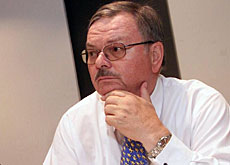Swiss defend German spelling reform

Switzerland is pushing hard for spelling reforms in German to be implemented a year from now, amid stiff opposition from leading German publishers.
Culture and education officials from German-speaking countries met in Vienna on Monday to thrash out the issue.
Controversy over the spelling reform broke out earlier this month after German publishers Springer and Spiegel as well as the “Süddeutsche Zeitung” newspaper announced they intended to abandon the new language rules.
All three maintain that the reform has not brought about the intended simplification and has only created greater confusion.
The rules break up some of German’s notoriously long words, eliminate excessive commas and simplify spelling.
Classroom chaos?
Hans Ulrich Stöckling, head of the Swiss Conference of Cantonal Education Directors, says that abandoning the reforms now would lead to total chaos in classrooms.
The Conference of Culture Ministers from the German Länder (states), which is in charge of the new German orthography, is also determined to implement the spelling reform.
Hans Ambühl, secretary of the Conference of Cantonal Education Directors, represented Switzerland at the Vienna meeting.
Also present were officials from Austria and Liechtenstein, as well as members of the German Conference of Culture Ministers.
Though no concrete decisions were taken during Monday’s meeting, delegates discussed the proposed new “Council for the German spelling”.
The council – which will include critics of the reform – is due to replace the “Interstate Commission on German Orthography”, a body of experts currently in charge of setting up the new spelling rules.
Unanimous
In June German culture ministers decided unanimously to introduce the new spelling rules in August 2005, as previously agreed.
Stöckling said the decision was binding for the Swiss education system, schools and the federal administration.
But if the reform in Germany failed to materialise, Switzerland would also drop the new rules, he explained, and this would lead to utter chaos in classrooms.
Stöckling maintains that the situation would be very confusing for pupils and teachers alike, because they would not know which rules to apply.
“This would [damage] the language as nobody would care about spelling rules at all,” he said.
Chop and change
“In schools you cannot change the spelling rules every few years,” said the president of the national teachers’ umbrella organisation, Beat Zemp.
Stöckling agrees with this assessment, adding that “several evaluations have shown that youngsters make fewer mistakes when learning and employing the new spelling rules”.
Another reason for not ditching the reform, Stöckling said, was that switching over to new teaching materials would be very expensive.
But the recent row has spurred on opponents of the reform in Germany and Switzerland.
The Swiss authors Adolf Muschg, Urs Faes and Primin Meier appealed to the education authorities not to carry through with the reform, but to have independent experts review it.
Petition
Many linguists support this position, but the views of teachers themselves are less clear. Teachers of German at grammar schools have been asked to sign a petition stating their opposition, but it is not yet known how many have signed it.
In contrast to the publishing houses in neighbouring Germany, all Swiss publishers – with the exception of the “Neue Zürcher Zeitung” newspaper – have adopted the new spelling rules, and do not want to abandon them.
Editors at the “Tages-Anzeiger” newspaper, Ringier (publisher of the “Blick” newspaper) and Jean Frey (“Weltwoche”) intend to discuss the spelling reform again.
Other larger newspapers are likely to follow the news agencies, which will have to agree on a common position.
swissinfo with agencies
Germany, Austria and Switzerland introduced new spelling rules in August 1998.
The rules break up some of German’s notoriously long words, eliminate excessive commas and simplify spelling.
But this month three influential German publishers said they would abandon the new rules.
The spelling reform is expected to come into force in August 2005.

In compliance with the JTI standards
More: SWI swissinfo.ch certified by the Journalism Trust Initiative


You can find an overview of ongoing debates with our journalists here. Please join us!
If you want to start a conversation about a topic raised in this article or want to report factual errors, email us at english@swissinfo.ch.